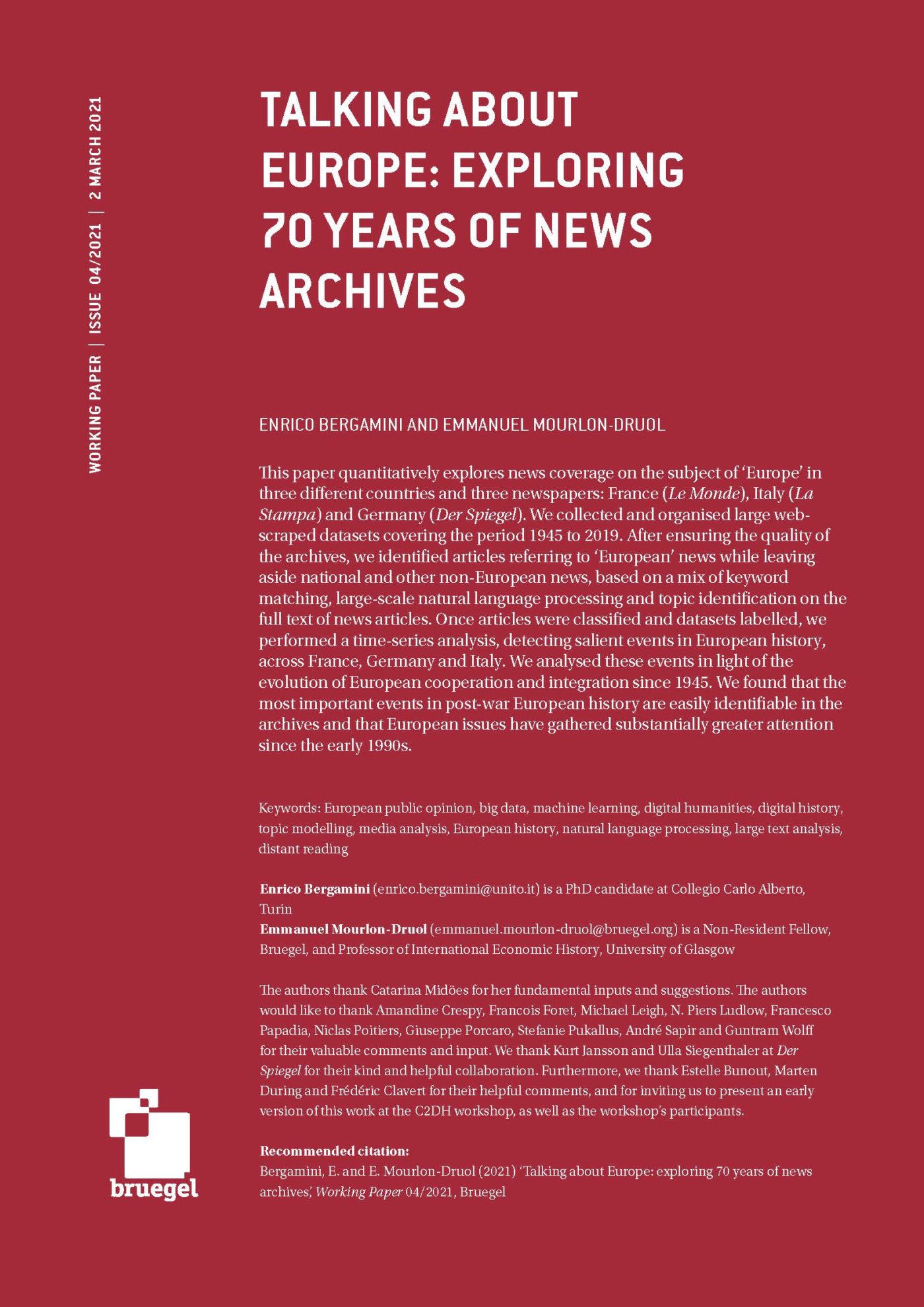Blog Post
What Swiss voters expect to happen next, after EU talks fail
Proponents and opponents of the Swiss-EU institutional framework agreement have different takes on the impact of a success or failure of the agreement.
This article was originally published in German by DeFacto.
Switzerland’s bilateral relationship with the European Union has been the subject of intense debate for years. In 2014, the two sides began negotiations on the terms of an institutional framework agreement that would institutionalise their bilateral relationship. On 26 May, the Swiss government announced that it was withdrawing from these negotiations and would not sign the agreement.
The EU has repeated that, in the event of failure, it will no longer conclude any new market access agreements with Switzerland and will not update any existing agreements. This would cause problems ranging from new certification hurdles for the medical sector and the mechanical engineering industry to a reduction in electricity security and severe limitation of opportunities for Swiss researchers to participate in Horizon Europe.
*The EU-Switzerland institutional framework agreement
The ‘InstA’ is intended to institutionalise the relationship between Switzerland and the EU more strongly, in particular by dynamically updating the current bilateral market access agreements and providing a dispute settlement mechanism for any conflicts over the application and interpretation of the bilateral agreements. The objective of the institutional framework agreement is to consolidate and further develop bilateral relations between Switzerland and the EU. In addition to Swiss fundamental opposition on sovereignty grounds, the agreement ultimately failed because three outstanding issues (relating to wage protection, the EU citizenship directive, and state aid rules) could not be resolved.
Erosion of the bilateral relationship or creeping EU accession?
Switzerland is a direct democracy, so any international treaty must be ratified through a popular referendum. But the Swiss public is split on the InstA issue. This is not surprising as the opinions of Swiss voters differ widely on the opportunities and risks of concluding the institutional framework agreement and its failure. The only thing both sides agree on is that the question “framework agreement, yes or no” is of great relevance for the future bilateral relationship.
InstA supporters fear an erosion of the bilateral path and a gradual exclusion of Switzerland from the European single market and other benefits of the European integration project. The opposing side fears that the conclusion of the institutional framework agreement will weaken Switzerland’s national sovereignty and that the agreement could be the first step toward ‘creeping EU accession’.
Expectations of how the bilateral relationship will develop after the signing or failure of the institutional framework agreement vary widely, as a survey of 1492 respondents conducted in September 2020 by a team of researchers led by Stefanie Walter at the University of Zurich shows. Respondents were asked to assess the medium-term development of bilateral relations on a scale of 0 (no cooperation) to 10 (Switzerland joining the EU). Figures 1 and 2 show the expectations of both sides about the development of the EU-Switzerland relationship in these two scenarios: acceptance (Figure 1) and failure (Figure 2) of the institutional framework agreement.
The figures show that respondents who would definitely or rather vote in favour of the institutional framework agreement rated the impact on a cooperative relationship with the EU as stronger than respondents who would vote against it: on average a value of 6.7, compared to a value of 5.8 on the side of the opponents.
Interestingly, both sides expected similar ‘integration effects’ from the institutional framework agreement. Both groups saw the institutional framework agreement as a step towards stronger cooperation with the EU in the order of about one point on the 0 to 10 scale. However, since both groups also assessed current bilateral relations differently (red line in the charts), the proponents expected the institutional framework agreement to lead to stronger cooperation with the EU overall than the opponents.
This movement toward more cooperation corresponds to the preferences of respondents who were in favour of the institutional framework agreement (dark blue dashed line), as they generally saw a somewhat closer relationship between Switzerland and the EU – but not EU accession – as the ideal scenario. For the opposing side, however, this was not the case: for these voters, the status quo of Swiss-EU bilateral relations with its dense web of bilateral treaties strongly corresponded to their ideal. A change toward more cooperation as a result of the institutional framework agreement would therefore shift the status quo in a direction they would not favour.
Figure 1: Bilateral relations: ideal scenario, status quo and expected development on adoption of the institutional framework agreement, September 2020.
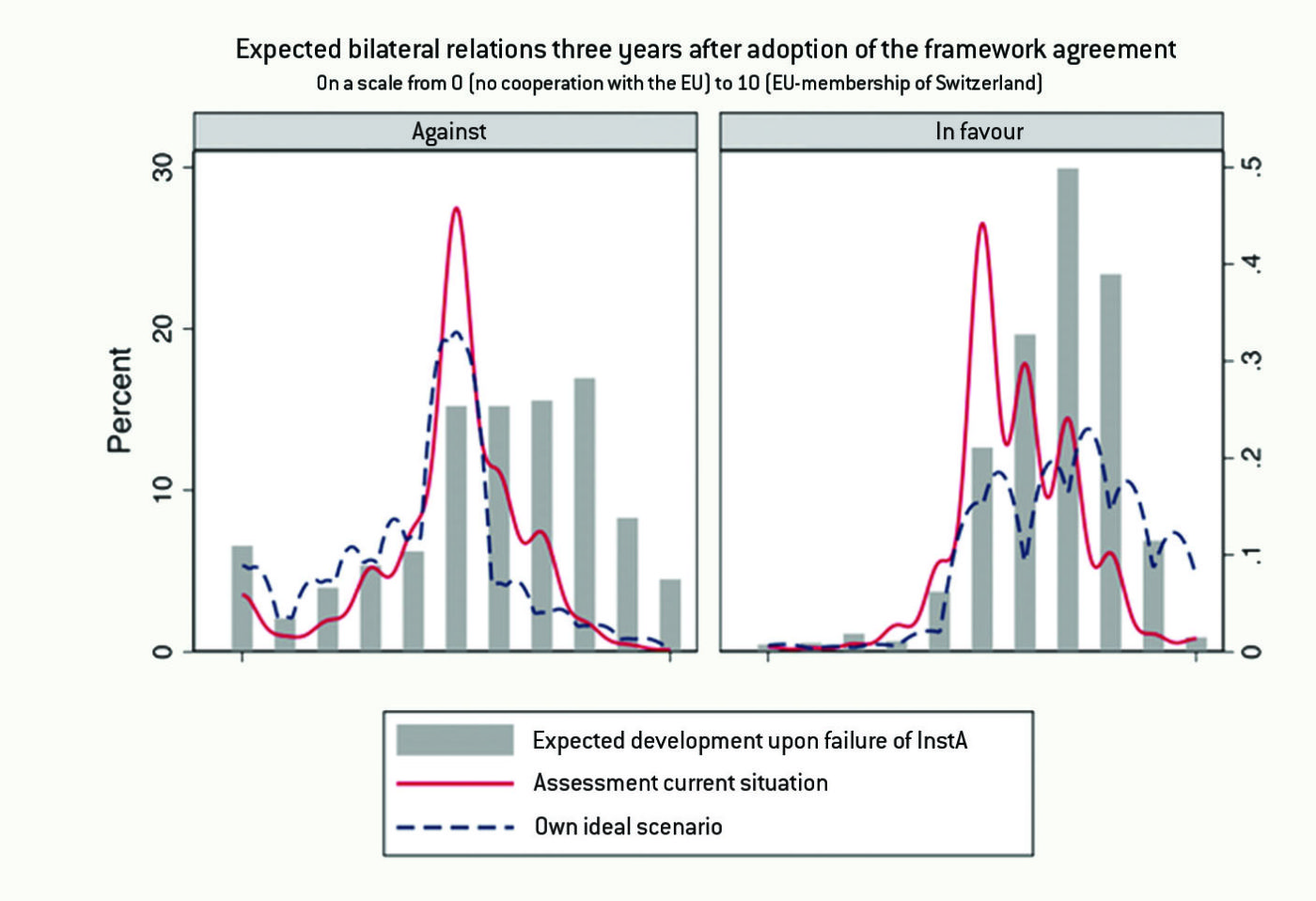
Opinions on failure diverge sharply
Opinions on the consequences of a failure of the institutional framework agreement, on the other hand, diverged more sharply. Although both sides expected a move toward a less-cooperative relationship, the supporters of the agreement feared a much more significant deterioration in bilateral relations overall.
Taking the assessment of the current state as a reference point, supporters expected a reduction in cooperation to the tune of 2.2 points, while opponents expected a reduction of only 0.9 points. At the same time, the mean value of bilateral relations expected in case of failure was significantly closer to the opponents’ ideal scenario than in case of acceptance of the agreement (distance of 0.3 points in case of failure and 1.7 points in case of acceptance).
For the supporters of the agreement, on the other hand, a failure would mean a significant deterioration in Swiss-EU relations compared to their ideal scenario (distance of 3.4 points). In contrast, an acceptance of the agreement comes close to their ideal scenario with a distance of 0.3 points.
Figure 2: Bilateral relations: ideal scenario, status quo and expected development in the event of a failure of the institutional framework agreement, September 2020
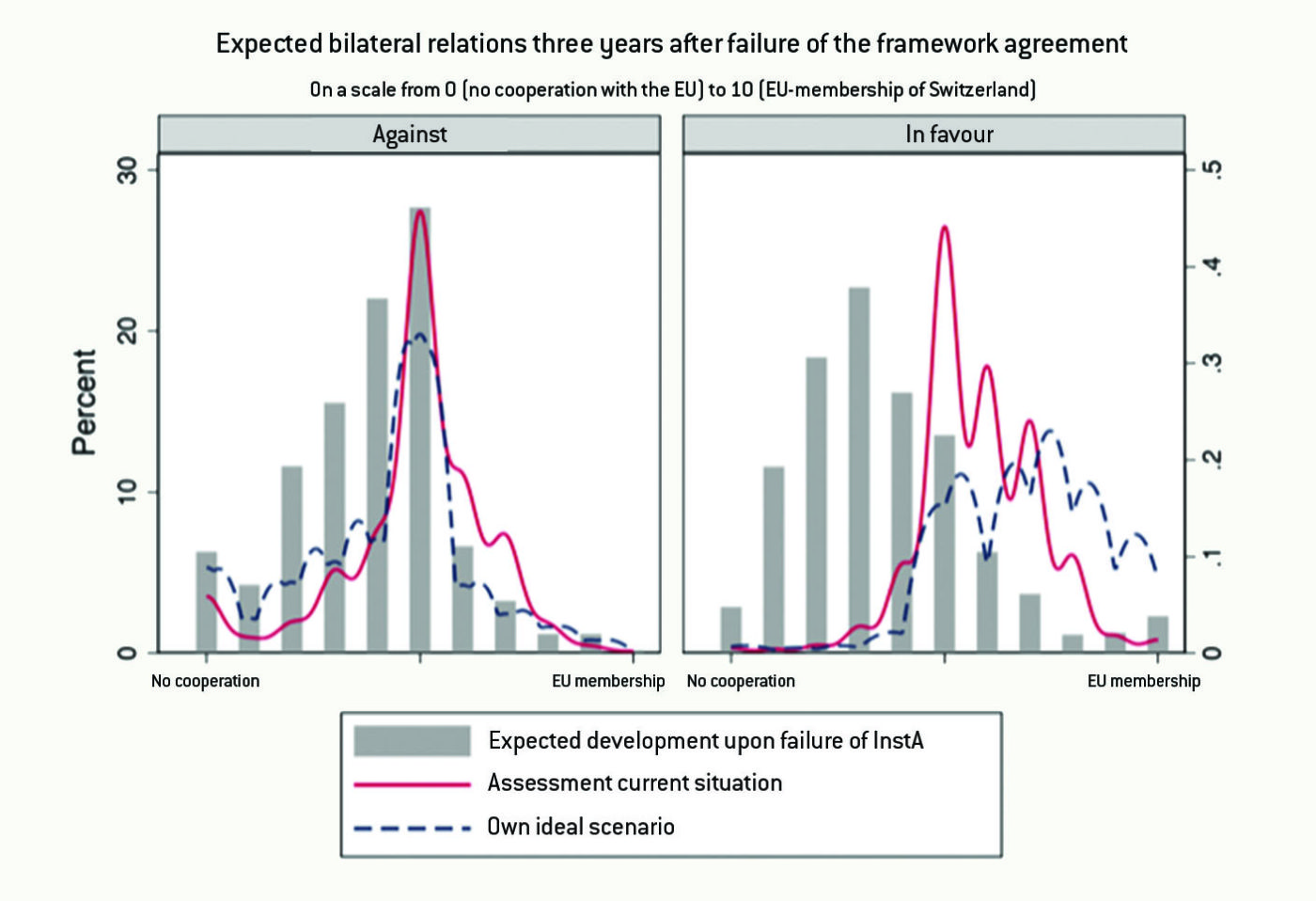
What are the opportunities and risks of a Plan B?
Given the differences in wishes and expectations on both sides, it was not surprising that both sides also assessed the risks of a failure of the institutional framework agreement differently.
Based on data from February 2021, Figure 3 shows that respondents who would certainly vote against the agreement thought that an erosion of the bilateral treaties would have no impact on Switzerland. Neither did they not see any risks in the case of new negotiations on an institutional framework agreement, but expected the EU to be about as willing to compromise as in the current draft. That said, they also did not see much chance that the EU would be more willing to compromise.
All other groups, on the other hand, feared that Switzerland would be negatively impacted if the EU indeed refuses to update existing agreements and does not conclude any new agreements with Switzerland until an institutional framework agreement is signed. In addition, respondents who would vote for the institutional framework agreement expected that the EU would be less willing to compromise in the event of a failure and a subsequent second attempt at negotiations, than with the current draft.
Recollections of the failed German-Swiss state treaty on the settlement of the aircraft noise dispute suggest that this is certainly a possible scenario. That treaty was rejected by the Swiss parliament in 2003 as not sufficiently favourable to Switzerland. Germany subsequently imposed unilateral restrictions on flight movements, so that Switzerland ended up in a significantly worse situation than envisaged in the rejected state treaty.
Figure 3: Individual expectations about the consequences of failure and renegotiation of the institutional framework agreement, February 2021
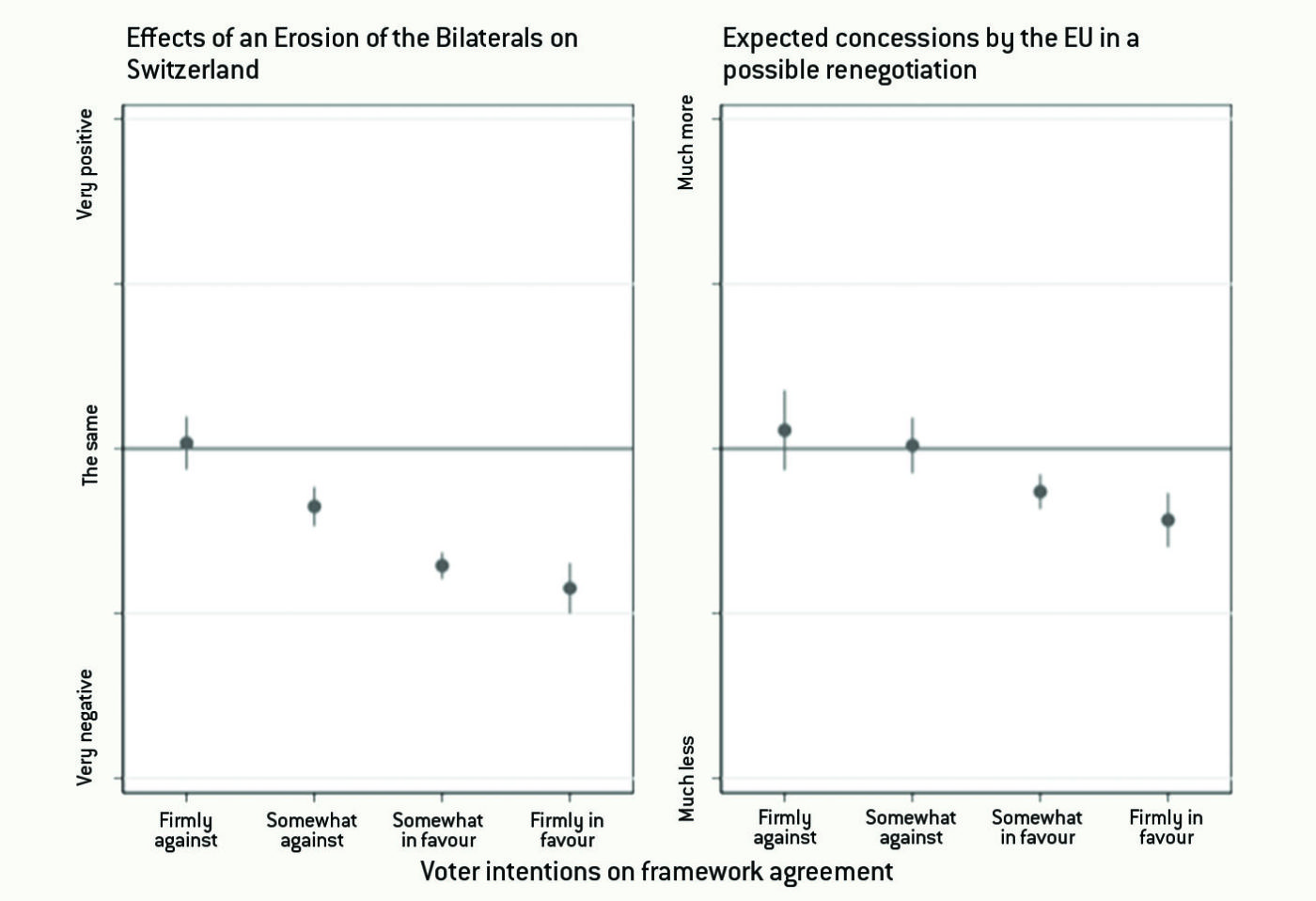
Such strong differences in individual expectations about the consequences of non-cooperative decisions in international relations are not unusual.
Various studies document similar differences, for example, among British respondents before the 2016 Brexit referendum, when the pro-Brexit side considered the risks of Brexit to be significantly lower than the opposing side and were convinced, for example, that the UK would not lose barrier-free access to the European single market even after a Brexit. Similarly, in the 2015 Greek bailout referendum, a majority of ‘No’ voters were convinced that a no vote would force the other euro states to make greater concessions in negotiations on the terms of a bailout package. However, these expectations about the willingness of the negotiating partner to make far-reaching concessions proved to be too optimistic in both cases.
The negotiating strategy: Brexit as a model?
The parallels to Brexit are not merely theoretical; the Brexit process has strongly shaped the political process in Switzerland around the institutional framework agreement. Negotiations were conducted in the shadow of Brexit, the debate on the institutional framework agreement repeatedly referred to Brexit, and the Brexit process itself helped to influence the voting intentions of the Swiss electorate on European policy. Against this background, it is not surprising that the question of the extent to which the British negotiation strategy should be a model for Switzerland has been the subject of heated debate.
Figure 4 shows that respondents’ opinions on this question also diverged widely. While opponents of the institutional framework agreement believed that the British threat to let the negotiations fail rather than accept a bad deal led to a greater willingness to compromise on the part of the EU, those in favour of the agreement saw no effect on the EU’s willingness to compromise.
Together with the perceived low risks of a failure of the negotiations and the perceived success of the British threat strategy, it is not surprising that respondents who reject the institutional framework agreement also tended to see the British Brexit negotiation strategy as a role model for Switzerland. By contrast, supporters of the institutional framework agreement tended to see this confrontational strategy as a deterrent example for Switzerland.
Figure 4: Individual assessments of the British Brexit negotiation strategy, February 2021
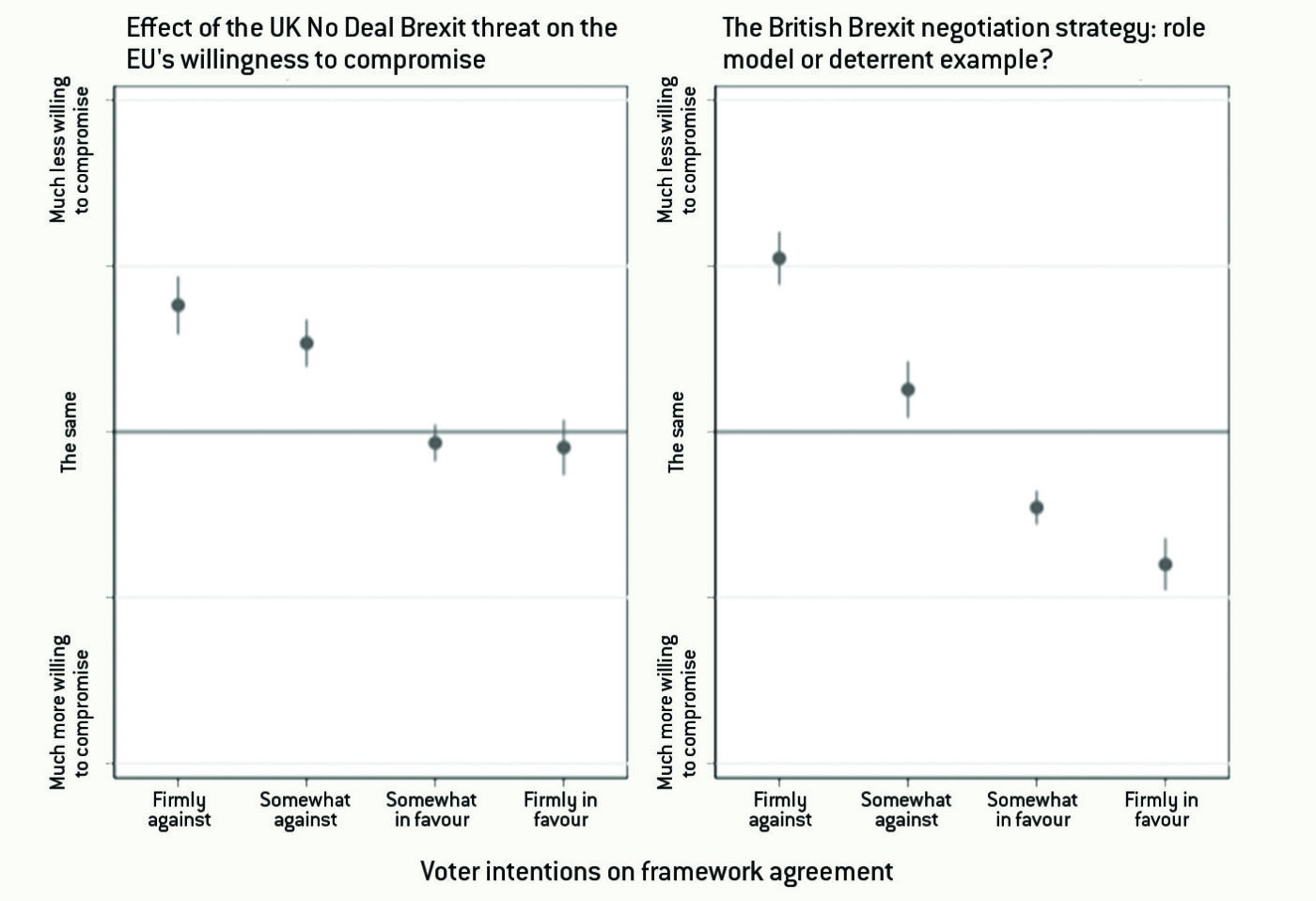
Unequal perceptions of supporters and opponents
Overall, it is clear that the political divide between supporters and opponents of the institutional framework agreement exists not only at the level of political elites, but can also be observed among the electorate. It is noteworthy that both sides not only assess the effects of a conclusion and a failure of the framework agreement differently, but that they even perceive the status quo of current bilateral relations differently.
Although an erosion of the bilateral treaties would be a lengthy affair, upcoming EU decisions on Switzerland’s participation in the European research programme Horizon Europe, or in the EU COVID-19 certificate scheme, will provide the first indications as to whether the optimism of the opponents or the fears of the supporters are justified.
| *Data and Method
Within the framework of the ERC-funded research project The Mass Politics of Disintegration, a group of researchers led by Prof. Dr. Stefanie Walter at the University of Zurich has collected detailed data on the opinions of Swiss citizens on Swiss-EU bilateral relations, Brexit and current debates on European policy, giving an insight into the expectations of supporters and opponents of the institutional framework agreement. Within the framework of a four-wave survey, a total of 2633 Swiss citizens were asked on several occasions for their opinions on Swiss-EU relations and foreign policy. Figures 1 and 2 refer to the survey period 9-28 September 2020 (N=1493); Figures 3 and 4 refer to the survey period 8-28 February 2021 (N=1353). |
Republishing and referencing
Bruegel considers itself a public good and takes no institutional standpoint. Anyone is free to republish and/or quote this post without prior consent. Please provide a full reference, clearly stating Bruegel and the relevant author as the source, and include a prominent hyperlink to the original post.













